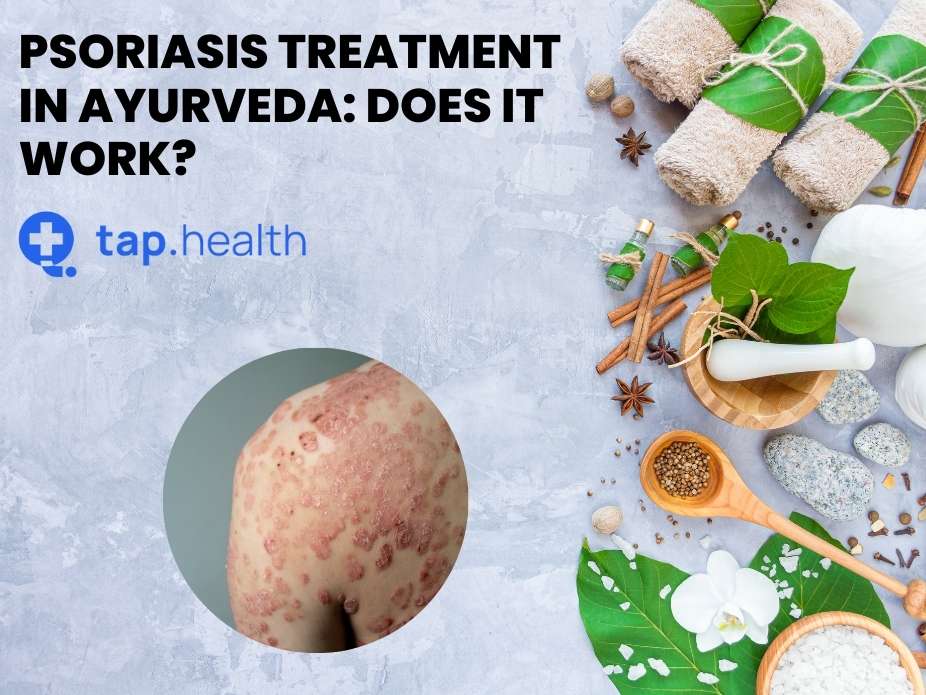Psoriasis is a chronic skin condition that can be both physically uncomfortable and emotionally distressing. For those seeking alternative treatments, Ayurveda offers promising approaches. This ancient Indian system of medicine focuses on holistic healing and natural remedies. In this blog post, we will explore how Ayurveda can be used to treat psoriasis, including the methods, benefits, and potential risks.
What is Psoriasis?
Psoriasis is an autoimmune disease that causes rapid skin cell growth, leading to thick, red, scaly patches on the skin. These patches can appear anywhere on the body but are most commonly found on the elbows, knees, scalp, and lower back. Psoriasis is not contagious, but it can significantly impact a person’s quality of life due to itching, pain, and the social stigma associated with visible skin conditions.
Causes of Psoriasis
The exact cause of psoriasis is not fully understood, but it is believed to involve a combination of genetic, immune, and environmental factors. Here are some key contributors:
- Genetics: Psoriasis tends to run in families. If a parent has psoriasis, the risk of developing the condition increases.
- Immune System: Psoriasis is an autoimmune disorder where the immune system mistakenly attacks healthy skin cells.
- Triggers: Various factors can trigger or worsen psoriasis, including stress, infections, skin injuries, smoking, and certain medications.
What Ayurvedic Treatments Are Used for Psoriasis?
Ayurveda views psoriasis as a result of imbalances in the body’s doshas (Vata, Pitta, and Kapha). The treatment aims to restore balance through diet, lifestyle changes, herbal remedies, and detoxification processes. Here are some Psoriasis Treatment in Ayurveda:
1. Panchakarma
This is a detoxification and purification process that removes toxins from the body. It includes therapies like Vamana (emesis), Virechana (purgation), Basti (enema), Nasya (nasal administration), and Raktamokshana (bloodletting).
2. Herbal Remedies
Herbs such as turmeric, neem, aloe vera, and guggul are often used for their anti-inflammatory and healing properties.
3. Dietary Changes
Ayurveda recommends a diet that pacifies the aggravated doshas. This often includes a vegetarian diet, avoiding spicy and acidic foods, and increasing intake of fresh fruits and vegetables.
4. Topical Treatments
Ayurvedic oils and pastes made from herbs like neem, turmeric, and coconut oil can be applied to the skin to soothe and heal psoriasis patches.
Home Remedies and Lifestyle Changes
In addition to Ayurvedic treatments, certain home remedies and lifestyle changes can help manage psoriasis symptoms:
1. Moisturize Regularly
Keeping the skin hydrated can reduce dryness and scaling. Use natural moisturizers like coconut oil or aloe vera.
2. Sun Exposure
Moderate sun exposure can help improve psoriasis symptoms. However, it is important to avoid overexposure and sunburn.
3. Stress Management
Since stress can trigger psoriasis flare-ups, practices like yoga, meditation, and deep breathing exercises are recommended.
4. Healthy Diet
A balanced diet rich in fruits, vegetables, whole grains, and lean proteins can support overall health and may reduce psoriasis symptoms.
5. Regular Exercise
Physical activity can help reduce stress and improve overall well-being, which may help control psoriasis.
Is Ayurvedic Medicine Safe for Psoriasis?
Ayurvedic medicine is generally considered safe when practiced by qualified professionals. However, it is essential to consult with a healthcare provider before starting any new treatment, especially if you have underlying health conditions or are taking other medications. Ayurvedic treatments should complement, not replace, conventional medical treatments unless advised by a healthcare provider.
Risks Associated when Treating Psoriasis with Ayurveda
While Ayurvedic treatments can be beneficial, there are some potential risks to be aware of:
- Unqualified Practitioners: Receiving treatment from unqualified or unlicensed practitioners can lead to improper diagnosis and treatment.
- Allergic Reactions: Some individuals may be allergic to certain herbs or ingredients used in Ayurvedic treatments.
- Interaction with Conventional Medications: Ayurvedic herbs and treatments can interact with conventional medications, leading to adverse effects.
- Lack of Regulation: In some regions, Ayurvedic products are not strictly regulated, which can result in variations in product quality and safety.
FAQ on Psoriasis Treatment in Ayurveda
1: Can Ayurveda cure psoriasis completely?
A: Ayurveda aims to manage and reduce the symptoms of psoriasis rather than providing a complete cure. Long-term management and lifestyle changes are often necessary.
2: How long does it take to see results with Ayurvedic treatment for psoriasis?
A: The time frame varies depending on the individual, the severity of the condition, and adherence to the treatment plan. Some may see improvements within a few weeks, while others might take several months.
3: Are there any dietary restrictions in Ayurveda for psoriasis?
A: Yes, Ayurveda often recommends avoiding spicy, acidic, and processed foods, while increasing intake of fresh fruits, vegetables, and whole grains.
4: Can I use Ayurvedic treatments alongside conventional treatments for psoriasis?
A: It is possible to combine Ayurvedic and conventional treatments, but it is crucial to consult with healthcare providers to avoid interactions and ensure a cohesive treatment plan.
5: What are some common Ayurvedic herbs used for psoriasis?
A: Common herbs include turmeric, neem, aloe vera, guggul, and manjistha, known for their anti-inflammatory and healing properties.
References
For further reading and reliable sources on psoriasis and Ayurvedic treatments, consider visiting the following links:



